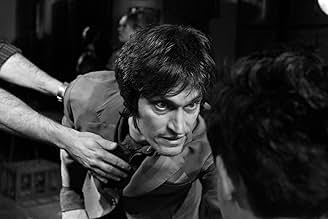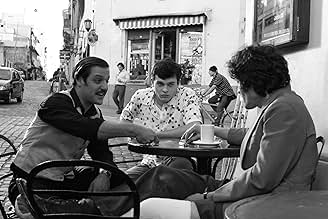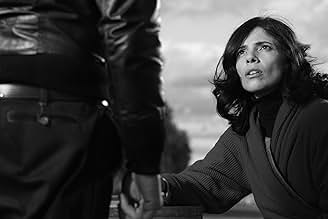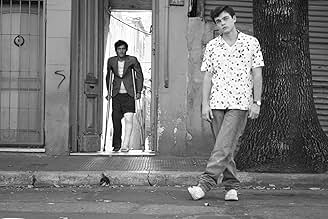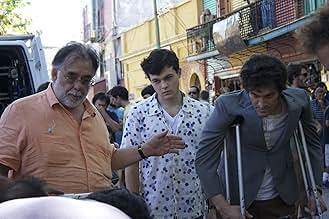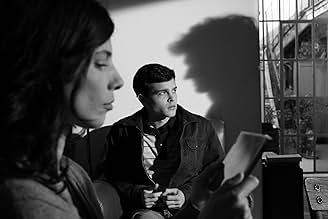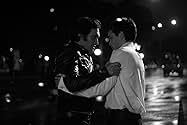CALIFICACIÓN DE IMDb
6.8/10
14 k
TU CALIFICACIÓN
Bennie viaja a Buenos Aires para encontrar a su hermano, un escritor fue prometedor y que ahora es una sombra de lo que era. El ver la obra casi terminada de su hermano es clave para compren... Leer todoBennie viaja a Buenos Aires para encontrar a su hermano, un escritor fue prometedor y que ahora es una sombra de lo que era. El ver la obra casi terminada de su hermano es clave para comprender su pasado común y renovar su vínculo.Bennie viaja a Buenos Aires para encontrar a su hermano, un escritor fue prometedor y que ahora es una sombra de lo que era. El ver la obra casi terminada de su hermano es clave para comprender su pasado común y renovar su vínculo.
- Dirección
- Guionistas
- Elenco
- Premios
- 1 premio ganado y 6 nominaciones en total
Rodrigo de la Serna
- José
- (as Rodrigo De La Serna)
Erica Rivas
- Ana
- (as Érica Rivas)
Sofía Gala Castiglione
- María Luisa
- (as Sofía Castiglione)
- Dirección
- Guionistas
- Todo el elenco y el equipo
- Producción, taquilla y más en IMDbPro
Opiniones destacadas
17 year-old Bennie works as a waiter on a cruiseship. When the ship suffers engine difficulties and docks in Buenos Aires, he uses the opportunity to attempt to reconnect with his estranged brother Tetro, a once promising writer. He is welcomed with open arms by Tetro's girlfriend, Miranda. She longs to know the truth behind her boyfriends past and what made him the misanthrope he is today. Tetro is hostile towards his brother, his plan was to never see any of his family again, and so keeps him at arms length. Bennie discovers an incomplete play, written in code whilst his brother was undergoing psychiatric treatment. He decides to finish the play and enter it in a festival run by Argentina's most powerful critic, Alone. Faced with this upheaval, Tetro is forced to come to terms with his relationship to his younger brother and his father, a famous conductor.
Tetro is, at its core, a film about family, in particular the relationship between brothers and their Father. A theme Francis Ford Coppola has immersed himself in before, most notably in The Godfather and Rumble Fish. Through a series of flashbacks we are given a glimpse of major events in Tetro's youth, his relationship with his father (played by Klaus Brandauer) and his subsequent departure. There are huge family secrets known only to Tetro and revealed to Bennie in an ending which echoes great literary and operatic works. Coppolas love of opera and theater is stamped all over the script and the city of Buenos Aires seems to be the perfect background in which to set this story.
Shot stunningly in digital monochrome with colour flashbacks, it has some aesthetic similarities to Rumble Fish. Coppola and cinematographer Mihai Malaimare Jr. reportedly site On The Waterfront and La Notte as big influences on the films visual style. There are certainly elements of both here, with the film also retaining its visual sense of self. It is operatic in both its narrative and its mise-en-scene. The idea of cutting between colour and monochrome as well as changing aspect ratios sounds as if it would be jarring, and it typically is. But for the purposes of Tetro it works perfectly.
Seen as a controversial choice by some, Vincent Gallo brings an edge to the titular character that some other actors may have lacked. However it is newcomer Alden Ehrenreich who steals the show as Bennie, a wayward teenager looking for guidance and approval. Maribel Verdu, as Miranda, provides the conduit between the two in a typicaly solid performance.
Hollywood is littered with once great directors who have fallen from grace, which makes Tetro all the more remarkable as a return to form from one of the greatest, Francis Ford Coppola.
Tetro is, at its core, a film about family, in particular the relationship between brothers and their Father. A theme Francis Ford Coppola has immersed himself in before, most notably in The Godfather and Rumble Fish. Through a series of flashbacks we are given a glimpse of major events in Tetro's youth, his relationship with his father (played by Klaus Brandauer) and his subsequent departure. There are huge family secrets known only to Tetro and revealed to Bennie in an ending which echoes great literary and operatic works. Coppolas love of opera and theater is stamped all over the script and the city of Buenos Aires seems to be the perfect background in which to set this story.
Shot stunningly in digital monochrome with colour flashbacks, it has some aesthetic similarities to Rumble Fish. Coppola and cinematographer Mihai Malaimare Jr. reportedly site On The Waterfront and La Notte as big influences on the films visual style. There are certainly elements of both here, with the film also retaining its visual sense of self. It is operatic in both its narrative and its mise-en-scene. The idea of cutting between colour and monochrome as well as changing aspect ratios sounds as if it would be jarring, and it typically is. But for the purposes of Tetro it works perfectly.
Seen as a controversial choice by some, Vincent Gallo brings an edge to the titular character that some other actors may have lacked. However it is newcomer Alden Ehrenreich who steals the show as Bennie, a wayward teenager looking for guidance and approval. Maribel Verdu, as Miranda, provides the conduit between the two in a typicaly solid performance.
Hollywood is littered with once great directors who have fallen from grace, which makes Tetro all the more remarkable as a return to form from one of the greatest, Francis Ford Coppola.
Tetro may be the "best" film Francis Ford Coppola has made in over 15 years. Whether this speaks more to the quality of his present state of direction as an artist or on the relative hits and misses of his career in the dregs of Hollywood (be it aiming high and just missing the mark with Godfather 3 and Dracula to stuff that went over people's heads like Youth Without Youth to even crap like Jack) is a combination. He's someone who attained financial success at a time, but then lost nearly all of it and along with it, arguably, some of his artistic merit. But after years of laying low and making wine, and making a whacked-out experiment that people either dug as an abstract piece or hated to hell ('Youth'), he comes out with Tetro like a porn star with a five-foot erection. He's got something to prove, if not to his audience then himself, and he proves it with a story that is personal and a film-making technique that recalls other masters but never too directly.
Tetro is about family, a subject Coppola is, of course, well-versed in being it the notorious kind (of course, the Godfather) and the more low-level and oddly intimate (Rumble Fish). It's a story, as with Rumble Fish, told in crisp black and white widescreen with flashes of color for flashbacks which may or may not be real, and as homage to operas like The Tales of Hoffmann. The title character, wonderfully and intensely portrayed by Vincent Gallo, is in a creative exile in Buenos Aires, a once promising writer living with his doctor-wife (Maribel Verdu, great as always) who is paid a visit one day by a young man, his brother Bennie (baby-faced newcomer Alden Ehrenreich) who hasn't seen him in years. There's secrets withheld by Tetro, not least of which about their parents, and soon an unfinished, longhand written play by Tetro (real name Angelo) is discovered by Bennie in a suitcase. He'll finish his brother's play, but at what cost?
The damaged, almost bi-polar writer, the insistent and impressionable brother, the strong but uncertain woman, these characters are fully realized by Coppola, and then on top of this comes a sort of terrific puzzle that is constructed through Tetro's unfinished play: what about their father, a famous composer (Klaus Maria Brandeur) who split them apart, possibly, or possibly not? What about their mother, who died in a car accident? What about the bond between Tetro and his former mentor, "Alone", the dubbed "most important critic in South America" who has created a pretentious empire around herself? Questions arise, and Coppola rises to the challenge of giving the audience answers but not spoon-fed. It's first and foremost a story of family, of brothers who love but have to find ways to contend with their damaged selves(inspiration being Rocco and His Brothers mayhap), and it's here that it's just about classic, on par with Rumble Fish if not even deeper and wiser about the effect of parents, or lack thereof, in lives spent and possibly wasted.
The writing is immensely interesting, always, even when Coppola may fall into over-indulging in his fantastic self-indulgence as an artist, such as with the operatic flourishes towards the end (this may not make sense, but compared to the WAY over indulgence of the hard-to-defend Y. W. Y it will). If anything the little imperfections, those brush strokes that go so high with the colors and shadows and impressionistic lighting that he and DP Mihai Malaimaire Jr engage in (one who hopefully will be getting more work following such spectacular work on a mix of 35mm and HD) along with Walter Murch's dependable editing, make it an even stronger work. It should feel a little messy here and there, because its subject matter is about finding a sense of purpose, in each other and in one's art. One feels Coppola working through a history of close but torn family ties, of losing loved ones (i.e. His own son), and at the same time a love of them all and of cinema peeking through in nearly every scene, even the ones where it doesn't look like much is going on.
Tetro is the antidote, basically, for this month's Transformers sequel. If you need to find the polar opposite of a picture based practically on just making money and reeling in the crowds with its dumb giant robot battles and preposterous and shallow theatrics, look no further than a picture which cares about its characters, its multi-faceted story and themes, and about projecting a technique that hearkens back to cinema of the 50s and 60s while sticking to an originality by its filmmaker. This will likely stay with me for a while, which is what Coppola's most profound works have done.
Tetro is about family, a subject Coppola is, of course, well-versed in being it the notorious kind (of course, the Godfather) and the more low-level and oddly intimate (Rumble Fish). It's a story, as with Rumble Fish, told in crisp black and white widescreen with flashes of color for flashbacks which may or may not be real, and as homage to operas like The Tales of Hoffmann. The title character, wonderfully and intensely portrayed by Vincent Gallo, is in a creative exile in Buenos Aires, a once promising writer living with his doctor-wife (Maribel Verdu, great as always) who is paid a visit one day by a young man, his brother Bennie (baby-faced newcomer Alden Ehrenreich) who hasn't seen him in years. There's secrets withheld by Tetro, not least of which about their parents, and soon an unfinished, longhand written play by Tetro (real name Angelo) is discovered by Bennie in a suitcase. He'll finish his brother's play, but at what cost?
The damaged, almost bi-polar writer, the insistent and impressionable brother, the strong but uncertain woman, these characters are fully realized by Coppola, and then on top of this comes a sort of terrific puzzle that is constructed through Tetro's unfinished play: what about their father, a famous composer (Klaus Maria Brandeur) who split them apart, possibly, or possibly not? What about their mother, who died in a car accident? What about the bond between Tetro and his former mentor, "Alone", the dubbed "most important critic in South America" who has created a pretentious empire around herself? Questions arise, and Coppola rises to the challenge of giving the audience answers but not spoon-fed. It's first and foremost a story of family, of brothers who love but have to find ways to contend with their damaged selves(inspiration being Rocco and His Brothers mayhap), and it's here that it's just about classic, on par with Rumble Fish if not even deeper and wiser about the effect of parents, or lack thereof, in lives spent and possibly wasted.
The writing is immensely interesting, always, even when Coppola may fall into over-indulging in his fantastic self-indulgence as an artist, such as with the operatic flourishes towards the end (this may not make sense, but compared to the WAY over indulgence of the hard-to-defend Y. W. Y it will). If anything the little imperfections, those brush strokes that go so high with the colors and shadows and impressionistic lighting that he and DP Mihai Malaimaire Jr engage in (one who hopefully will be getting more work following such spectacular work on a mix of 35mm and HD) along with Walter Murch's dependable editing, make it an even stronger work. It should feel a little messy here and there, because its subject matter is about finding a sense of purpose, in each other and in one's art. One feels Coppola working through a history of close but torn family ties, of losing loved ones (i.e. His own son), and at the same time a love of them all and of cinema peeking through in nearly every scene, even the ones where it doesn't look like much is going on.
Tetro is the antidote, basically, for this month's Transformers sequel. If you need to find the polar opposite of a picture based practically on just making money and reeling in the crowds with its dumb giant robot battles and preposterous and shallow theatrics, look no further than a picture which cares about its characters, its multi-faceted story and themes, and about projecting a technique that hearkens back to cinema of the 50s and 60s while sticking to an originality by its filmmaker. This will likely stay with me for a while, which is what Coppola's most profound works have done.
I can see a lot of connection between Copolla's 1983 Rumble Fish and this 2009 Tetro. Firstly there's that same inky black monochrome that's as dark as night and with the occasional splash of colour. Then, there's the brotherly relationship, here between Vincent Gallo and Alden Ehrenreich.
It's a while since I last watched Rumble Fish but the brothers there were Mickey Rourke (a rare good film for him at that time) and Matt Dillon. It's about street gangs and pool halls and how an older brother can be very impressionistic on a younger sibling. I'll say no more, except it's a blinder of a film and better than this.
I would have to say that the monochrome cinematography here, though, that everybody drools over is just too dark and contrasty, for this subject and film. I'm a photographer, so hopefully know and whilst Rumble Fish looked superb, that was full of geometric angles and angular paradoxes. Here, the screen is often plunged into almost darkness much of the time.
There is a balletic beauty to much of it though and we veer away from Rumble Fish and on to his works of epic greatness. The Godfathers and Apocalypse Now all share with this, an operatic build up of artistic and emotional tension that is mesmerising. Tetro has this toward the end at the Festival and we start anticipating something big and great. Do we get it? You'll have to see it yourself...
Others have touched on the actual storyline and I'm going to leave that to them. That said, the cast are all good but oddly, Vincent Gallo, as Tetro seems to short-change us. Not performance wise but in that we just don't seem to get to know him, which is part of the whole story, of course. Clamming up into a shell is nature's way of protecting us, emotionally, which is what Tetro did - and still does.
One major plus to this, very bog-standard DVD, was the sound quality - I 'felt' the sound as much as heard it. It prickled my eardrums with a tactile clarity, certainly Hi-fi standard, plus. OK, it was through separate amp and speakers but is as all my TV watching is.
Is Tetro a film for you? That's a difficult one. Art-house cinema lovers probably will and those who like a drama that is quite complex also but those who want action and something akin to Apocalypse Now, no. It is long, visually rich and dark (like plain chocolate) and accordingly, not for everybody but for those who do, it holds many strengths.
It's a while since I last watched Rumble Fish but the brothers there were Mickey Rourke (a rare good film for him at that time) and Matt Dillon. It's about street gangs and pool halls and how an older brother can be very impressionistic on a younger sibling. I'll say no more, except it's a blinder of a film and better than this.
I would have to say that the monochrome cinematography here, though, that everybody drools over is just too dark and contrasty, for this subject and film. I'm a photographer, so hopefully know and whilst Rumble Fish looked superb, that was full of geometric angles and angular paradoxes. Here, the screen is often plunged into almost darkness much of the time.
There is a balletic beauty to much of it though and we veer away from Rumble Fish and on to his works of epic greatness. The Godfathers and Apocalypse Now all share with this, an operatic build up of artistic and emotional tension that is mesmerising. Tetro has this toward the end at the Festival and we start anticipating something big and great. Do we get it? You'll have to see it yourself...
Others have touched on the actual storyline and I'm going to leave that to them. That said, the cast are all good but oddly, Vincent Gallo, as Tetro seems to short-change us. Not performance wise but in that we just don't seem to get to know him, which is part of the whole story, of course. Clamming up into a shell is nature's way of protecting us, emotionally, which is what Tetro did - and still does.
One major plus to this, very bog-standard DVD, was the sound quality - I 'felt' the sound as much as heard it. It prickled my eardrums with a tactile clarity, certainly Hi-fi standard, plus. OK, it was through separate amp and speakers but is as all my TV watching is.
Is Tetro a film for you? That's a difficult one. Art-house cinema lovers probably will and those who like a drama that is quite complex also but those who want action and something akin to Apocalypse Now, no. It is long, visually rich and dark (like plain chocolate) and accordingly, not for everybody but for those who do, it holds many strengths.
Released in 2009 and directed by Francis Ford Coppola, "Tetro" is drama about two American brothers in Buenos Aires, Argintina. The younger one, Bennie (Alden Ehrenreich), idolizes the older, Tetro (Vincent Gallo), and hasn't seen him in a dozen years because he mysteriously cut all ties with the family and moved to Argentina, where he lives with his girlfriend, Miranda (Maribel Verdú). Bennie discovers his brother's near-finished play and is obsessed with completing it without his permission, perhaps because he senses it holds the answers he seeks. Klaus Maria Brandauer plays the arrogant conductor father while cutie Sofía Gala is on hand as a young Argentinan girl that fancies Bennie. The movie is primarily in B&W, but with color flashbacks.
"Tetro" is an artful and somewhat hypnotic adult-oriented drama by the master filmmaker, the very opposite of conventional Hollywood blockbusters. Ehrenreich is reminiscent of Leonardo DiCaprio when he was young while Gallo is broodingly charismatic as the eponymous protagonist. Coppola has always had a good eye for female cast and "Tetro" delivers the goods with Verdú and Gala, although I wish the latter had more screen time. There's a revelation at the end that I failed to anticipate, but should have because everything in the story points to it.
Francis said at the Cannes film festival that "nothing in (the movie) happened, but it's all true." In other words, the film's autobiographical in some ways. The challenge is to perceive the parallels. Two are obvious seeing as how Coppola's father was a famous conductor. The other is when South America's most honored critic asks Tetro if her opinion matters to him anymore and he honestly says it doesn't; sticking her nose in the air, she silently walks away. Like Tetro, Coppola no longer cares what critics think of his works. It's akin to Kurtz' disposition toward the pathetic brass in "Apocalypse Now." The critic's name in the film is fittingly "Alone," played by Carmen Maura. Then there's the fact that Francis has a brother he's been known to have a love/hate relationship with, not to mention how his nephew, Nicolas Cage, is a little reminiscent of the titular character. But none of this speculation really matters; all that matter is that "Tetro" is a creative, operatic, entertaining drama. But stay away if you need constant 'exciting' things going on, like explosions, absurd action scenes and the corresponding CGI (not that there's anything wrong with that, lol).
The film runs 127 minutes and was shot in Buenos Aires & the Andes, Argentina with studio work done in Spain.
GRADE: B
"Tetro" is an artful and somewhat hypnotic adult-oriented drama by the master filmmaker, the very opposite of conventional Hollywood blockbusters. Ehrenreich is reminiscent of Leonardo DiCaprio when he was young while Gallo is broodingly charismatic as the eponymous protagonist. Coppola has always had a good eye for female cast and "Tetro" delivers the goods with Verdú and Gala, although I wish the latter had more screen time. There's a revelation at the end that I failed to anticipate, but should have because everything in the story points to it.
Francis said at the Cannes film festival that "nothing in (the movie) happened, but it's all true." In other words, the film's autobiographical in some ways. The challenge is to perceive the parallels. Two are obvious seeing as how Coppola's father was a famous conductor. The other is when South America's most honored critic asks Tetro if her opinion matters to him anymore and he honestly says it doesn't; sticking her nose in the air, she silently walks away. Like Tetro, Coppola no longer cares what critics think of his works. It's akin to Kurtz' disposition toward the pathetic brass in "Apocalypse Now." The critic's name in the film is fittingly "Alone," played by Carmen Maura. Then there's the fact that Francis has a brother he's been known to have a love/hate relationship with, not to mention how his nephew, Nicolas Cage, is a little reminiscent of the titular character. But none of this speculation really matters; all that matter is that "Tetro" is a creative, operatic, entertaining drama. But stay away if you need constant 'exciting' things going on, like explosions, absurd action scenes and the corresponding CGI (not that there's anything wrong with that, lol).
The film runs 127 minutes and was shot in Buenos Aires & the Andes, Argentina with studio work done in Spain.
GRADE: B
After a career that has consisted of the "Godfather" movies, "Apocalypse Now", "The Outsiders", Bram Stoker's "Dracula" and "Youth without Youth" - to name just a few - where would Francis Ford Coppola go next? He directed "Tetro", about the secret history of an Italian-Argentinian family.
Benjamin Tetrocini (Alden Ehrenreich) arrives in Buenos Aires and goes to visit his brother Angelo (Vincent Gallo). The embittered Angelo is now going by the name Tetro. As the movie progresses, a series of important topics about the family gets revealed, and how it has always affected the relationship between the two brothers.
Coppola uses one of the most unusual devices to tell the story. The present is filmed in stark black-and-white, while the past is shown in a slightly grainy color. It's as if the past was supposedly apparent - to show that the characters thought that they knew everything that was going on - while the present is supposedly unclear (to show that there are things to be discovered). I read that the movie pays homage to "The Tales of Hoffman", but I don't know that one, so I have to take the movie at face value. And what I saw certainly impressed me. I definitely recommend this movie.
Also starring Maribel Verdú, Carmen Maura, Klaus Maria Brandauer, and Rodrigo de la Serna (who co-starred in "The Motorcycle Diaries" and is a relative of Che Guevara).
Benjamin Tetrocini (Alden Ehrenreich) arrives in Buenos Aires and goes to visit his brother Angelo (Vincent Gallo). The embittered Angelo is now going by the name Tetro. As the movie progresses, a series of important topics about the family gets revealed, and how it has always affected the relationship between the two brothers.
Coppola uses one of the most unusual devices to tell the story. The present is filmed in stark black-and-white, while the past is shown in a slightly grainy color. It's as if the past was supposedly apparent - to show that the characters thought that they knew everything that was going on - while the present is supposedly unclear (to show that there are things to be discovered). I read that the movie pays homage to "The Tales of Hoffman", but I don't know that one, so I have to take the movie at face value. And what I saw certainly impressed me. I definitely recommend this movie.
Also starring Maribel Verdú, Carmen Maura, Klaus Maria Brandauer, and Rodrigo de la Serna (who co-starred in "The Motorcycle Diaries" and is a relative of Che Guevara).
¿Sabías que…?
- TriviaFrancis Ford Coppola claimed that this is the kind of film he set out to make as a young man, before he was sidetracked by fame and fortune.
- ErroresEarly in the movie Tetro stumbles into the kitchen with a broken leg and knocks over some furniture while lighting a cigarette using a burner on the stove. he ignites the burner by just turning the knob on the stove. A few minutes later Miranda must use a match to light a burner on the same stove-top.
- ConexionesFeatured in At the Movies: Cannes Film Festival 2009 (2009)
- Bandas sonorasEl Búho
(2007) (uncredited)
Written & Performed by Lisandro Aristimuño
Courtesy of Los Años Luz Discos SRL
Selecciones populares
Inicia sesión para calificar y agrega a la lista de videos para obtener recomendaciones personalizadas
- How long is Tetro?Con tecnología de Alexa
Detalles
- Fecha de lanzamiento
- Países de origen
- Idiomas
- También se conoce como
- Francis Ford Coppola's Tetro
- Locaciones de filmación
- Productoras
- Ver más créditos de la compañía en IMDbPro
Taquilla
- Presupuesto
- USD 5,000,000 (estimado)
- Total en EE. UU. y Canadá
- USD 518,522
- Fin de semana de estreno en EE. UU. y Canadá
- USD 30,504
- 14 jun 2009
- Total a nivel mundial
- USD 2,874,474
- Tiempo de ejecución2 horas 7 minutos
- Color
- Mezcla de sonido
- Relación de aspecto
- 2.35 : 1
Contribuir a esta página
Sugiere una edición o agrega el contenido que falta







